#Intellectual freedom
Explore tagged Tumblr posts
Text

Libraries are Punk
Layne McCaleb
393 notes
·
View notes
Text
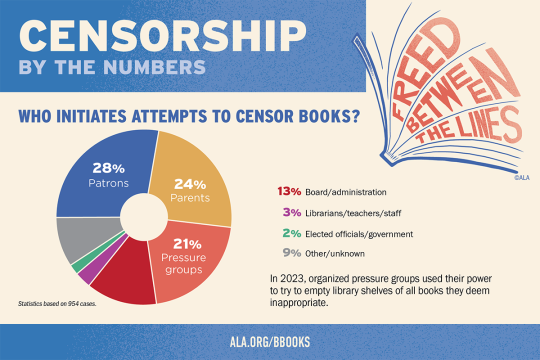


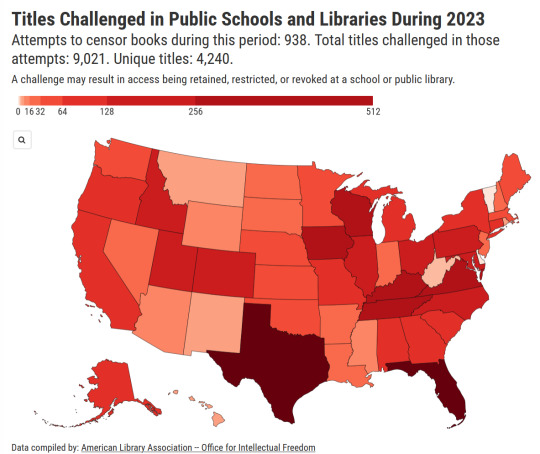
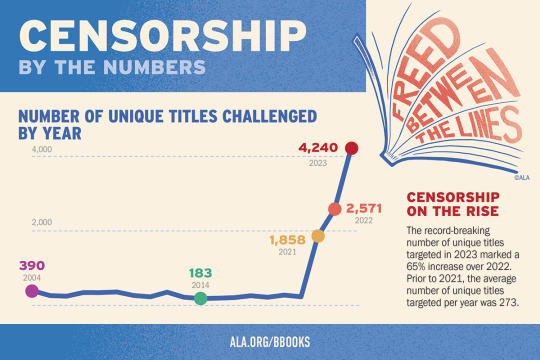
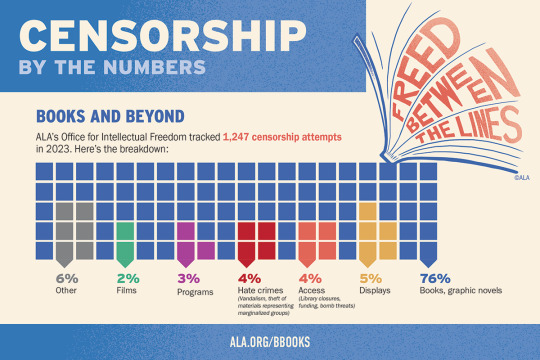
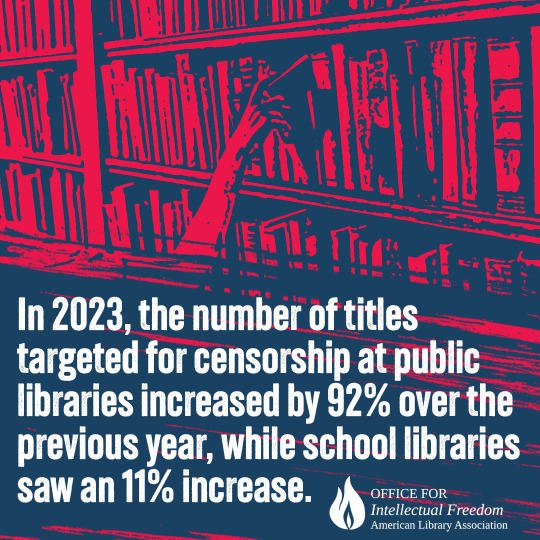
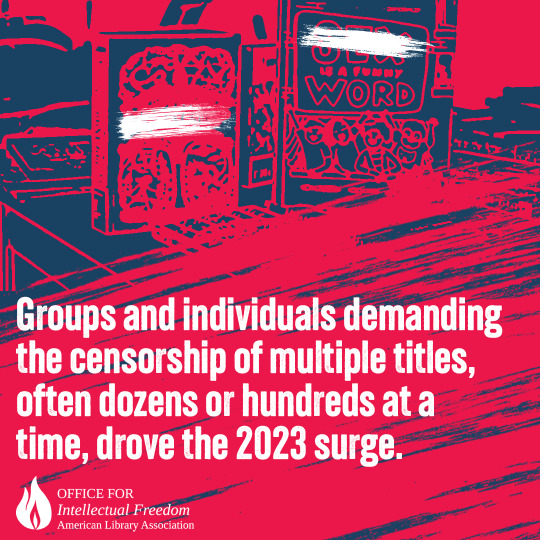
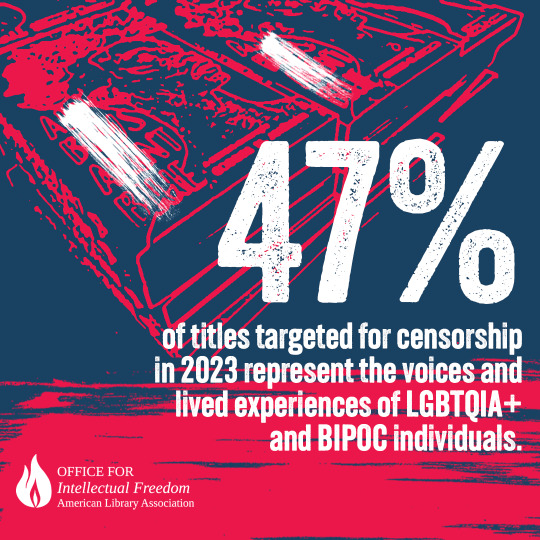
The ALA's State of America's Libraries Report for 2024 is out now.
2023 had the highest number of challenged book titles ever documented by the ALA.
You can view the full PDF of the report here. Book ban/challenge data broken down by state can be found here.
If you can, try to keep an eye on your local libraries, especially school and public libraries. If book/program challenges or attacks on library staff are happening in your area, make your voice heard -- show up at school board meetings, county commissioner meetings, town halls, etc. Counterprotest. Write messages of support on social media or in your local papers. Show support for staff in-person. Tell others about the value of libraries.
Get a library card if you haven't yet -- if you're not a regular user, chances are you might not know what all your library offers. I'm talking video games, makerspaces (3D printers, digital art software, recording equipment, VR, etc.), streaming services, meeting spaces, free demonstrations and programs (often with any necessary materials provided at no cost!), mobile WiFi hotspots, Library of Things collections, database subscriptions, genealogy resources, and so on. A lot of electronic resources like ebooks, databases, and streaming services you can access off-site as long as you have a (again: free!!!) library card. There may even be services like homebound delivery for people who can't physically come to the library.
Also try to stay up to date on pending legislation in your state -- right now there's a ton of proposed legislation that will harm libraries, but there are also bills that aim to protect libraries, librarians, teachers, and intellectual freedom. It's just as important to let your representatives know that you support pro-library/anti-censorship legislation as it is to let them know that you oppose anti-library/pro-censorship legislation.
Unfortunately, someone being a library user or seeing value in the work that libraries do does not guarantee that they will support libraries at the ballot. One of the biggest predictors for whether libraries stay funded is not the quantity or quality of the services, programs, and materials it offers, but voter support. Make sure your representatives and local politicians know your stance and that their actions toward libraries will affect your vote.
Here are some resources for staying updated:
If you're interested in library advocacy and staying up to date with the challenges libraries are facing in the U.S., check out EveryLibrary, which focuses on building voter support for libraries.
Book Riot has regular articles on censorship attempts taking place throughout the nation, which can be found here, as well as a Literary Activism Newsletter.
The American Library Association's Office for Intellectual Freedom focuses on the intellectual freedom component of the Library Bill of Rights, tracks censorship attempts throughout each year, and provides training, support, and education about intellectual freedom to library staff and the public.
The Electronic Frontier Foundation focuses on intellectual freedom in the digital world, including fighting online censorship and illegal surveillance.
I know this post is long, but please spread the word. Libraries need your support now more than ever.
155 notes
·
View notes
Text
Early DS9 Garak would not recognize himself as the baddie in this meme.
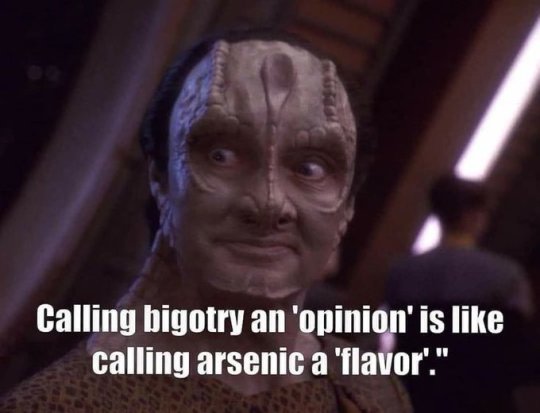
If you post stuff about the Paradox of (In)Tolerance or memes like this in order to inform the vulnerable that you see them and consider their concerns to be your concerns, this does not really pertain to you. Different people have different understandings of the function of a meme or a pithy saying and that is part of what makes communication in this medium so bedeviling.
However, there is a sort of "In this house we..." type of poster who I believe understands themselves as doing an act of communication with the explicit intent to shame bigots and to inform bigotry curious normies that its not okay.
I am extremely pro-discourse with anyone who is acting in goodfaith on an interpersonal level and I am still pro-discourse with people who are acting in badfaith if done with the express purpose to try to provide a better representation of the ideas the badfaith actor routinely strawmans. Meme wars ain't that. Or at least shallow memes.
And this? This is a shallow meme. I'm sorry, but it is. Its a weak form of engagement that feels good to share, may reassure some allies, but if reassurance isn't the point, then its almost entirely a waste of bandwidth. And let me state again: reassurance is a valid use of bandwidth, I just don't think most people sharing this stuff have that as their primary motive.
Let me unpack this using Garak as a case study.
Among the majority of Star Trek fans whose complaints about Discovery don't begin or end with "identity politics" it ought not to be controversial to call early DS9 Garak a fascist. Heck, depending on your feelings about his actions in "In the Pale Moonlight" Garak may very well still be a fascist, albeit one who is questioning, until late into DS9.
He's not a fascist in the sense that he checks every silly little box that would describe a German who has bought into an Aryan fantastical reimagining of malignant Italian nostalgia for the "good old days" of the Roman Empire. Rather Garak appears to be believe in the innate desirability of a strong paternalistic state that advances the interests of its people, as defined by its oligarchy, through expansionary violence abroad while using hefty amounts of coercion backed by threat of violence to ensure order at home.
This is fascism not as a specific historic belief system, but rather the colloquial fascism. A thermostatic measurement of how fast the average citizen can be exposed to state violence, how narrow their civil liberties are, and how fast those liberties can be suspended if authorities within the state deem it necessary. Rights are far from inalienable in the face of the collective good, as dictated by a narrow elite whose only accountability is censure or murder by a peer.
Colonization, assassination, and disinformation are tools without intrinsic moral weight detached from their aims. Murder isn't wrong because murder is wrong in Garak's world, murder is either an effective means to an end or it isn't. In Garak's moral universe, if murder is useful then murder is good. There's really never any sense from Garak that he is burning his decency to build a paradise he will never see - ala Andor's Luthen Rael or The Operative from Serenity. Garak lives easily with the things he's done, even enjoying throwing the way that Sisko benefited from the way that Garak did what Sisko himself understood was necessary but could not morally bring himself to do when it came to the murder of the Romulan Ambassador.
It might register on some level to Garak, especially later, that he's been conditioned by his society broadly and by his Obsidian Order training specifically to be far from unbiased when considering violence as a tool and thus he gives less weight than he probably ought to the downsides like blowback, unintended consequences, or just the risks of becoming too reliant on violence relative to other options. But ultimately it takes several seasons of exposure to Federation moral and practical arguments about the plurality and nonviolence to wear Garak down.
One could even argue he doesn't truly become a convert to something resembling Federation secular humanism until he is forced to watch proud Cardassia become a barely tolerated vassal to the Dominion and its these people that he, Quark and others have sneered at as soft, too trusting rubes who are willing to die to protect Garak from his own people. To be sure, its the Dominion that bombs Cardassia, but I think we can safely say that Garak understands by the end that its generations of self serving Legates, Obsidian Order directors including his own father, and their ruinous ideology with its unchecked ambition and stifling of imagination that set that particular historical Rube Goldberg machine in motion.
But for early Garak, his ruthless cultural chauvinism wasn't bigotry as he would understand it. The system produced unequal results by design but to him it wouldn't appear to be personal. Garak lived inside a zero sum ideology and thus it was necessary for his people to sabotage and loot other peoples. It was necessary for Garak personally to lie, torture, assassinate, and massacre. He didn't hate other races and cultures, he just preferred Cardassians be the ones to be the masters in a universe of dominator and dominated.
This is the archetypal reader who I most imagine as needing to see themselves as targeted in this meme but instead would gloss over it and find nothing controversial. At best, the reader who needs to see themselves in this meme would be irked by the meta signaling that their lib friends think they're racist and tolerate overt racism in their midst.
Still, they don't see themselves as the baddie because most of them are not Nick Fuentes or Nick Fuentes adjacent. There's only ever been a few thousand Proud Boys and that's according to the Proud Boys who have every reason to exaggerate. Instead what the average reader of concern is is comfortable with unequal outcomes, comfortable with social orders ordered by the stick rather than the carrot because they assume it creates meritocracy and even if it doesn't, a system that is more likely to issue a loan to people like themselves and less likely to gun them down in a routine traffic stop ensures their status and comfort are unlikely to be challenged in a world of scarcity.
Garak probably even thought Cardassians are biologically more intelligent than Klingons or Nausicaans because he thought the cultural products of Cardassia were intrinsically superior to those of the Klingons and the power and prosperity of the Cardassians relative to the Nausicaans were evidence of innate superiority. As for the Federation's dominance, most of the Federation's enemies rationalize it as a house of cards that will fall apart if enough pressure is applied to a pain point, while Garak and Quark would come to have a more nuanced view. They saw the Federation as a Human Empire hiding within a web of co-dependency, acquired favors, and cultural exports like root beer that erode out the foundations of enemies and result in assimilation if they're not careful to police their cultures.
It's not a stretch to think that the secular Cardassians told themselves they were civilizing the religiously stringent Bajorans and liberating them from their rigid caste structure by replacing it with a new, meritocratic hierarchy in which merit was defined as loyal and effective service to the Cardassians. Meanwhile slavery was a natural condition of those who could not be trusted to serve directly below the Cardassian overseers who were "reparenting" the Bajorans and redirecting natural resources back to Cardassia as payment for "services rendered."
The occupation of Bajor through Garak's eyes would not be an act of hate, far from it, but rather because the Cardassians were empirically superior so how could that be bigotry? The Bajorans could complain and kill all they wanted in the mistaken belief they deserved sovereignty but facts don't care about your feelings.
Gul Dukat on the other hand knows he's your villain and while he would prefer you recognize his superiority and love him for his magnanimity in being a less harsh master than some or the "supreme act of generosity" that is granting the Bajorans their freedom; a part of him would be tickled to know he lives rent free on your Promenade.
So what does this have to do with non-fiction? Think carefully about whether you think there are more Gul Dukats or Elim Garaks in the world and communicate appropriately. Communicate effectively.
Damned if I know what effectively even is, we've had ten years to figure this out and have demonstrably and spectacularly failed. I suspect a lot of it has to do with communicating better offline or 1:1 with people who already know us as more than just a witty handle and an avatar and thus can see as more fully human with hopes, dreams, fears, and feelings. I'm not unaware of the irony of this message coming at the end of a lengthy social media diatribe.
#election 2024#donald trump#civil rights#foucault's boomerang#intellectual freedom#project 2025#elim garak#garak#star trek#ds9#paradox of intolerance#paradox of tolerance#fascism#persuasion
12 notes
·
View notes
Text
The Power and Purpose of Strikes
Simone Weil, the philosopher/anarchist/mystic, describing an ideal political future for France after WW2, lamented that trade unions have become primarily concerned with wages. This might seem strange to us now, when even this activity is so contested by conservatives, but Weil saw it as playing too much into the capitalist spirit.
She saw this as just one of trade unions’, and the worst of the lot, because it encourages workers to think about personal monetary gain rather than justice, solidarity, and even their own needs beyond the material. It also risks the union becoming institutionalised through frequent direct interactions with established economic forces. Again, this will sound weird today, given how unions fighting for wages represent one of the few remaining avenues for working class justice, and yeah Weil was a Catholic with strong convictions about the importance of moralism, but I think fundamentally she had higher hopes than we can easily imagine today.
I think a lot of people sense the truth of what she says today - though unfortunately it’s usually conservatives, who would turn back on it immediately if they recognised what it was they were saying. You see it when they say “Why are train drivers striking? Why are writers striking? Why do they think they deserve more than nurses, or posties, or actors?” And of course, the answer is: “They should strike too!” (As some of them now are 🎉). But it’s true that the narrow focus on wages does foster a sort of competitive individualism which can undermine solidarity with other industries. This means that a more revolutionary conception of unions is needed, which is not what these critics have in mind, but it is what Simone Weil has in mind.
What Weil sees in trade unions is the potential for fostering community, freedom of intellectual and spiritual thought, and a degree of independence from capitalism, all of which amount to a greater degree of what she calls ‘rootedness’ - something involving confidence in truth, having material needs met, security in community, and relative freedom (among other things). She saw them as being able to foster solidarity to meet workers’ need for community, free them from the corrupting influence of monetary concerns, and fight for justice as a group. She also hoped that they could provide a space for freedom of thought, to avoid the fetishisation of community she saw in both the French and Russian revolutions.
Trade unions then should not merely concern themselves with accumulating resources, but also with accumulating time and freedom - with the expansion of what Henri Lefebvre called everyday life, the time in which we are free to do what we want and create new types of experiences. When we have enough of it, we can build our own institutions free from capitalist influence which can form the infrastructure for disruptive situations. This can be mutual aid groups, creative projects, intellectual and spiritual communities, and reimaginings of what it means to work, through permablitzing, learning crafts, and starting co-operatives.
The ideal version of this is the general strike. Walter Benjamin described the general strike as a form of divine violence, violence which acts instantaneously, bloodlessly, without coercion. Rather than sort of blackmailing capitalists, as most strikes do, the general strike is (ideally) a complete disengagement with the entire capitalist system. It asks nothing of it, and simply makes it irrelevant by building entirely new social relations in its place. This is not at all feasible with where we are at the moment, but I like to think that it can be used as an inspiration for incorporating more utopian ideas into our more limited actions, all of which are still so radical in this current climate.
#philosophy#sociology#social theory#anarchism#unions#trade unions#wga strike#sag strike#writers strike#ups strike#actors strike#train strikes#worker solidarity#solidarity#freedom#freedom of thought#intellectual freedom#communism#simone weil#walter benjamin#henri lefebvre#mutual aid#situationism
88 notes
·
View notes
Text
This is Professor Tiffany Willoughby-Herard, a true educator and advocate. Educators and students alike are sounding the alarm on administration and governmental oppression.
Listen to her every word. This is the new McCarthyism.
Repost from @mo_hamz
•
‼️EXTREMELY IMPORTANT THAT YOU WATCH AND SHARE WIDELY‼️
Reporter: “Are you concerned about this jeopardizing your job?”
UCI Tenured Professor: “What job do I have if my students don’t have a future?”
#human rights#free palestine#palestine#gaza#student activism#student intifada#gaza solidarity encampment#freedom of speech#academic freedom#uc irvine#intellectual freedom#right to protest#civil liberties#police brutality#acab#abolish the police#college
19 notes
·
View notes
Text
This weekend, on Saturday, October 19, libraries, bookstores, readers, and partners nationwide are hosting rallies and community events to unite against book bans and demonstrate our shared commitment to this fundamental freedom. Book bans and challenges in the U.S. reached an all-time high in 2023 and continue to happen at an alarming rate. It's more important than ever to show support for local libraries and the freedom to read.
Join us in person and online to unite against book bans and show the world that the freedom to read is an American value that must be protected.
Check your local library to find out if it is hosting a Freedom to Read Day of Action event!
And click through to Unite Against Book Bans to discover what steps you can take to fight to protect intellectual freedom and information access!
#freedom to read#unite against book bans#intellectual freedom#information access#libraries#public libraries#censorship
3 notes
·
View notes
Text
Headline is a bit hyperbolic but a good read!
3 notes
·
View notes
Text
Being a red shirt on the info literacy and empathy front lines.
This is a bit of a meta post and by "going there" I'm really just trying to generate more of the sort of "you are seen" genre for whomever it has meaning. If it has a whiff of "look at me, I'm an ally, I'm helping by yelling into the void" then I don't know really know what to tell you, maybe it is and if it is, feel free to keep on scrolling, I am not consciously demanding your affirmation, just rambling about the role of sci-fi in my life in getting me to this point ethically and professionally.
I am a red state millennial librarian. Don't feel as sorry for me as you might reflexively think I want you to. I'm not a public librarian or a public school librarian, I'm an academic librarian. Moms for Liberty hasn't directed its Eye of Sauron at us (yet.) Thus we're able to keep stocking LGBTQ literature without too much worry of people screaming at us. For now at least.
Why does this matter?
Well through a little loophole we are officially an academic library that provides services to young adults and the public in addition to formal college students without being a public or school library. I'm reluctant to share too many biographical details, but suffice to say you might be surprised at what is part of your nearest academic library collection and it may be easier than you think to access that collection.
Individual institutions are going to have their own policies, however because we are part of a broader consortium that all shares resources, we offer reciprocal services to every member of that consortium and their patrons if those patrons come to us with a valid library card from one of the member counties or a peer institution.
So if your public library has been gutted, take a peak at local colleges. They are more likely than you think to have queer literature, including queer and diverse literature in the YA genre, as well as inclusive children's books even picture books. College libraries know many of their students are either parents or are intending to go into public education (god help them) and thus have some very infrequently utilized special collections that they would love to see circulate so they can justify buying more.
This being a nerd blog, let me just speak briefly of the role of sci-fi and fantasy allegories in my development. I could very easily have been one of the people that I fear may come for my job. The people we have done workshops rehearsing how to respond professionally, empathetically, but also forcefully to formal challenges to what's on our shelves and informal challenges - i.e. people intent on making spectacles.
I don't say that I "fear" these people lightly, our head of DEI initiatives was sacked after the program was expected (and ultimately) was defunded. This person was not offered a job in a different department. I'm not super in touch with what goes on outside my department but I'm told that this person was broadly respected and other than their job title, was never involved in anything controversial or had any interpersonal disputes.
So we who are heteronormative don't get the luxury of putting our heads down and assuming this will blow over. We can't actually know with any certainty how many degrees of separation are between us and the ire of the Christian Nationalist fever that has swept the nation.
Anywho, Handmaid's Tale isn't exactly the sci-fi I meant to talk about (although boy howdy did it scare the bejeezus out of me the first time I listened to it and that was - I think - pre-2016.)
I grew up in a very rural area with minimal diversity. My exposure to diversity and later queer representation was almost entirely through media. Star Trek was a big one, but also Roseanne which ironically makes the comedian's red pilling more heart breaking than JK Rowling - its a xenniel thing, I was in my edgy ironic full of myself no time for childish things teenage years when Harry Potter came out.
I'm sitting here in 2023, and I can see the absurd falseness of the rhetoric of grooming discourse. Riker's fling with an androgynous alien or Jadzia Dax's open pansexuality didn't make me queer. It de-stigmatized being queer and left me open to taking seriously the self expressed experiences of people who I was open to befriending. As an adult, while I've found Discovery to be frustrating in many ways, one of the things that keeps me coming back is Culber and Stamets. Their performances and arcs have been a consistently solid part of an otherwise very messy production.
Much as Culber and Stamets are simply decent human beings just trying to get by and overcome crisis after crisis, so too are the queer people I've befriend. Their sinister agenda is to walk in public with their partner without people walking between them not thinking they're actually together or being harassed. Some of them are parents of developmentally well adjusted children.
I'm not looking for ally virtue signal points by praising these storylines, I'm just recognizing them for what they are: pieces of my development as a person. Which makes me happy to be in a place in my life where if nothing else, for now I get to make available a wide variety of experiences and perspectives for people to be exposed to. Its not my job to force anything on anyone and I order plenty of straight forward murder mysteries, romances, and swashbuckling epics that don't require a lot of critical thinking, but I like knowing that something I placed on the shelf might make someone accept themselves or accept someone else.
#red state library#books unite us#pride month#we need diverse books#star trek#academic libraries#intellectual freedom
14 notes
·
View notes
Text

Defying Silence:
3 Censorship Myths Exposed
#sdpl#zines#freedom to read#censorship#read banned books#emily morgan#calinda strayhorn#GNCRT#day of action#intellectual freedom
6 notes
·
View notes
Text

Reblogs were turned off so here is the post
The Verge article
Relevant tweet
#intellectual freedom#media preservation#archive#archive.org#archive dot org#hachette book group#harpercollins#wiley#john wiley and sons#penguin random house#random house#publishers
17 notes
·
View notes
Text
Use your head!
Discernment, reflection, testing, and intellectual renewal are all biblical mandates,
These Jews were more receptive than those in Thessalonica, for they welcomed the message very eagerly and examined the scriptures every day to see whether these things were so. Acts 17:11
Do not be conformed to this world, but be transformed by the renewing of your minds, so that you may discern what is the will of God—what is good and acceptable and perfect. Romans 12:2
Let two or three prophets speak, and let the others weigh what is said. 1 Corinthians 14:29
See to it that no one takes you captive through philosophy and empty deceit, according to human tradition, according to the elemental spirits of the universe, and not according to Christ. Colossians 2:8
But test everything; hold fast to what is good 1 Thessalonians 5:21
~ Samples, Kenneth Richard. ‘Without a Doubt: Answering the 20 Toughest Faith Questions. p. 256
2 notes
·
View notes
Text
I think its extremely valid to both feel that newspapers should not endorse candidates and be deeply, profoundly disturbed that Jeff Bezos is openly tearing down the firewall at WaPo to override the wishes of the WaPo editorial team.
I'm someone who thought that the firewall mostly really was real although not impenetrable. That Bezos' presence at the paper created a sort of gravitational pull that influenced the paper without him dictating what stories to run and what to kill.
But!
If you never thought the firewall was real, the counter argument defending the firewall is such an uphill climb that I would not personally expend energy making that argument, even though I do think it was *mostly* real although far from cast in neutronium.
#donald trump#election 2024#joe biden#kamala harris#intellectual freedom#journalistic freedom#Washington Post#WaPo#Jeff Bezos#robber barons#yellow journalism#oligarchy
3 notes
·
View notes
Text

Visit the United Against Book Bans website to access resources on how to take action to prevent and combat book bans, whether through direct action and protest, social media campaigns, or to donate to support librarians facing backlash in the defense of intellectual freedom
#united against book bans#book bans#library censorship#book banning#right to read#right to read day#intellectual freedom#libraries#librarians#support libraries
14 notes
·
View notes
Text

#whisper girl#girlblogging#manic pixie dream girl#coquette#coquette dollete#girlblogger#intellectual freedom#hell is a teenage girl#female manipulator
2 notes
·
View notes
Text
RED ALERT, LIBRARY FANS.
Discussion of this so-called library association may be coming soon to a library board meeting, city council meeting, or board of county commissioners meeting near you. Anyone who has the means and opportunity to speak in opposition to YOUR library investing ANY time or resources to support this hate-fueled shell game should absolutely do so. They aren't currently charging money for membership, which smells an awful lot like they've got hidden funders with an agenda to push. DO NOT LET THEM.
It's likely that members of groups like Moms for Liberty will start aggressively campaigning for their local libraries to abandon ALA in favor of this organization. It's free after all, and as far as they're concerned it's a fast track to everything they want to see happen in libraries: Good Christian Programming(tm), eradication of any books about LGBTQ+ or BIPOC experiences, and librarians who aren't able to do a damn thing about it. Our libraries need ALA now more than ever, and it'll take members of the community stepping up and showing overwhelming support to convince stubborn library oversight bodies to keep spending that money on dues for a "controversial" organization. There's strength in numbers, and being part of a professional organization with solid values and a robust network of other librarians to connect with and learn from is absolutely vital right now.
If you live in a small town, and especially if your library can't afford to join ALA (it's super pricey!), encourage your library to join the Association for Rural & Small Libraries as well/instead. (Full disclosure: I work with this organization, but I'm promoting them here in my capacity as an individual on my personal blog, not trying to be a sneaky ad or anything.) It's a purpose-built organization that supports the actual needs of small-town libraries without sacrificing the integrity of our institutions or our profession.
#librarian#libraries#support libraries#censorship#banned books#book banning#intellectual freedom#librarians#support your public library#public libraries#public library#school libraries
2 notes
·
View notes
Text
Capitalism and the Search for Truth: Unveiling the Hindrances
In today's globalized world, capitalism has become the dominant economic system, shaping societies, institutions, and even our pursuit of knowledge. While capitalism has its benefits, it is essential to examine its impact on the search for truth and the quest for knowledge. In this blog post, we will explore how capitalism can act as a hindrance to the pursuit of truth, stifling intellectual freedom, distorting information, and prioritizing profit over the common good.
Commercialization of Knowledge: Under capitalism, knowledge and information become commodified, subject to market forces and profit-driven motives. The commodification of knowledge can lead to the prioritization of research and information that is financially profitable rather than necessarily advancing truth and understanding. This bias can limit the exploration of unconventional or unprofitable ideas, hindering intellectual diversity and innovation.
Influence of Corporate Interests: In a capitalist society, corporations wield significant influence over the dissemination and production of knowledge. Corporate funding and sponsorship can shape research agendas, academic programs, and media narratives. This influence may result in conflicts of interest, where research and information are tailored to fit corporate agendas or protect corporate interests, potentially suppressing findings that challenge prevailing narratives or threaten profit-driven industries.
Inequality and Access to Education: Capitalism's inherent economic disparities can hinder the pursuit of truth by limiting access to education and opportunities for intellectual development. Unequal access to quality education, resources, and research facilities disproportionately affects marginalized communities. This deprivation of opportunities and knowledge perpetuates systemic inequalities, preventing diverse voices and perspectives from contributing to the collective search for truth.
Media Consolidation and Sensationalism: Under the capitalist media landscape, media outlets are often driven by profit motives, sensationalism, and the need for higher ratings. This focus on attracting viewers and maximizing profits can lead to a distortion of information and a prioritization of sensational stories over factual accuracy. The pursuit of truth can be undermined as media organizations strive to capture audience attention and generate advertising revenue, compromising the integrity of news reporting.
Intellectual Property and Patents: Capitalism's emphasis on individual ownership and proprietary rights can hinder the free exchange of knowledge. Intellectual property laws and patents can limit the dissemination of information, hindering collaborative efforts and impeding the collective search for truth. Profit-oriented motives may incentivize withholding or restricting access to vital scientific discoveries, impeding progress in fields that require open collaboration and sharing of knowledge.
While capitalism has fostered economic growth and innovation, it is important to critically examine its impact on the pursuit of truth and knowledge. By commodifying knowledge, promoting corporate interests, perpetuating educational inequalities, distorting information through media sensationalism, and prioritizing intellectual property rights, capitalism can pose significant challenges to the search for truth. As we navigate the complexities of our capitalist society, it is crucial to foster intellectual freedom, promote equitable access to education, encourage independent and critical thinking, and prioritize the common good over narrow profit-driven motives. By recognizing and addressing these hindrances, we can strive for a more inclusive and truth-seeking society that values the pursuit of knowledge for the betterment of all.
#Capitalism#Truth-seeking#Pursuit of knowledge#Intellectual freedom#Commodification of knowledge#Corporate influence#Conflicts of interest#Inequality in education#Media sensationalism#Intellectual property rights#Distortion of information#Capitalism and truth#Economic systems#Knowledge commodification#Access to education#Corporate influence on research#Media bias#Open exchange of knowledge#Common good#Critique of capitalism#philosophy#epistemology#knowledge#learning#ethics#education#chatgpt
4 notes
·
View notes